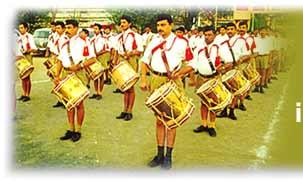
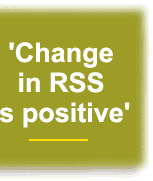
Maulana Abdul Hameed Nomani is an Islamic scholar and spokesman for the Jamiat Ulama-e-Hind.
The Jamiat was founded in 1919 during the Khilafat movement against British rule in India. It rallied around Mahatma Gandhi during the freedom struggle and opposed the creation of Pakistan.
Though the Jamiat says it is a non-political organisation, its current president Maulana Asad Madani was a Congress member of the Rajya Sabha.
The Jamiat, an important constituent of the All India Muslim Personal Law Board, started formal talks with the Rashtriya Swayamsewak Sangh in December for the first time. The talks are said to be an exercise to build bridges between the
Hindu and Muslim communities, including locating a possible solution to the temple-mosque row in Ayodhya.
At the Jamiat headquarters in Delhi, Nomani spoke to Ehtasham Khan after his organisation held two meetings with RSS leaders.
Mr Nomani, tell us about the Jamiat Ulama-e-Hind.
The Jamiat Ulama-e-Hind was formed in November 1919. Before Independence, the Jamiat's aims and objective were India's freedom, Islamic education, protection of the religious identity of Muslims, and fighting for the rights of Muslims according to the Shariat. After Independence, there was a convention in Lucknow under the leadership of Maulana Abul Kalam Azad (the freedom fighter, Islamic scholar and India's first education minister). There, it was decided that the Jamiat would no longer be a political outfit and rather provide social service to the community. It is involved in nation-building and fighting for the rights (of Muslims) within the framework of India's Constitution.
We run schools, madarssas and technical institutions all over India. We have branches in almost all the states, except Kashmir. We have a membership of about one crore (10 million) including ulama (Islamic scholars) and ordinary people. We are most active in rehabilitation of victims of sectarian violence. We fight their legal battles and for their compensation. We provide them medical help. We have opened up children's villages and built 5,000 homes to rehabilitate victims of the Gujarat violence. We have been doing similar work in other places.
The Jamiat is a social organisation.
Why are Muslims a backward community?
There are common problems like road, electricity, potable water and unemployment. But for Muslims, education is a major issue. Muslims are far behind other communities in education.
There is discrimination against Muslims in various walks of life. Muslims have been discriminated in politics. We are not properly represented in Parliament and state assemblies according to the proportion of our population. The situation is the same in government and semi-government organisations.
The community may be blamed to some extent for educational backwardness but the major problem is economic backwardness. People want to seek education and better education but they don't have the resources.
Privatisation has made the situation worse. We all know how government institutions work. A large population of Muslims cannot afford private education. When we cannot afford primary education, how will we go for higher education? Now even higher education is being privatised.
Many Muslims don't have the basic needs of life.
There are Zionist lobbies that want the Muslim world to remain backward. They frame such policies globally that it affects Muslims everywhere.
Once Muslims get economically empowered, then they can achieve social and culture empowerment as well.
Amidst all these issues, how important is the Ayodhya dispute?
It is important. No doubt. But it is not the only problem. President A P J Abdul Kalam has set the target of 2020 to make India a developed nation. If the whole society starts looking at Ayodhya leaving behind other issues then our country can never develop.
To solve this dispute, there are two ways. We have said we will abide by the court's verdict. Secondly, there could be a mutually agreed and honourable settlement between the two communities. Neither party should feel like losing or winning.
Together, we have to find a formula to settle this dispute. If any side becomes adamant, then it cannot be solved. Both of us will have to be flexible. We should open up our minds.
Now that the Lok Sabha election is coming, people may try to use it for political gains. The situation is like that. Therefore, we have not made the Ayodhya issue the focus of our discussion with the RSS. It is just one of the topics to be discussed.
Why the RSS and Jamiat? What is the locus standi of these organisations to solve the Ayodhya dispute? Will the people accept what you decide?
There is no doubt about it. Those who have been associated with this movement from the beginning of the dispute should be given priority. They should take the lead. The Jamiat took it up long ago, the day when the dispute started. All others joined in later.
What about the All India Muslim Personal Law Board?
The Board was formed in 1972. We are part of it. It (the AIMPLB) alone cannot claim leadership. This is not one man's issue. We have been handling the Ayodhya dispute before the Board came into existence.
The Board has criticised your discussions with the RSS.
I don't think so. There is no such problem. We will include the Muslim Board in our discussions with the RSS. We will not take any unilateral decisions. The discussion has just started.
What about the RSS? There are so many Hindu organisations fighting for Ayodhya.
It is their problem. They have to decide. Everybody knows who is more representative.
What is the basis of the 'differences' between Hindus and Muslims, if at all they exist?
Historically, there has been no difference among the masses. But at the political level, it has been there. There were differences between the Mughal rulers and Rajputs, then you have Shivaji and the Sikhs. During those days, ordinary people lived peacefully. There were occasional problems but those were individual cases. There was no movement or perspective indicating religious differences. Later on, several movements started to create differences between the two communities. These were well-planned movements with a perspective.
The British were responsible for creating this divide. They manipulated history and wrote books that sowed the seed of hate and dislike. For example, it is said one of the Khilji rulers fell in love with the queen of Mewar and wanted to win her at all cost. But this is baseless. This is not history, but a story. Malik Mohammed Jaisi wrote Padmawat in which he imagined these characters. He imagined Padmawat as the world and the ruler as desire. The whole story was built around this figment of imagination. Historian K S Lal wrote the Khilji Dynasty in which he proved that the story of the Khilji king forcibly taking the queen of Mewar was just imagination.
There are similar stories on Prithviraj Chauhan and Mohammed Ghauri. Many Hindu leaders like Giriraj Kishore and Vinay Katiyar present these stories as history. The stories of Muslim rulers committing atrocities on Hindus are all manufactured.
They say Hindus were forced to pay jaziya (the tax Hindus paid Mughal rulers). But jaziya was the same amount of tax Hindus paid before this system was introduced. Muslims had to pay zakat in place of jaziya. So it was equal for both communities. But these concepts were manipulated to create differences between the two communities.
The British played a major role to divide Hindus and Muslims. Swami Shardaanand gave a speech from Delhi's historic Jama Masjid that the British could not digest this unity. Many Muslim and Hindu leaders were used by the British to spread propaganda. These Muslim leaders had limited understanding of Islam.
Similarly, Hindu leaders like Aurobindo (Ghosh) and (Vinayak Damodar 'Veer') Savarkar worked to create differences in society. They could not digest the fact that Muslims in India were alive with their identity while all other communities who came from outside got assimilated in Hindu culture. This troubled them.
People say the RSS is also part of that movement. So why are you talking to RSS leaders?
Yes, the RSS is part of that movement and they have a grip over a large population in India. If talking to the RSS can solve problems, then we should talk. They have also acknowledged that the talks have been positive. It will give a good message to society.
Savarkar said Hindus and Muslims are two different nations. But the Jamiat thinks that all those who live in India are one nation. Religion has nothing to do with nationalism.
If they accept our understanding then it will give a good message to society.
RSS leaders have now (after the talks with the Jamiat) accepted that Muslims are part of this country. Muslims and Hindus are brothers. It is a good sign. It is a good change. Change in the RSS perspective is positive.
The situation is changing. The whole world is a global village. People all over the world are moving towards peace. Germans got united, India and Pakistan are talking, India and China are talking, so people living in the same country should also talk.
What issues are you raising with the RSS?
At our second meeting we discussed nationalism. Both of us agreed that the basis of nationalism is not religion. People living in one country are one nation. This acceptance is an achievement. If the talks proceed further, it may prove to be revolutionary.
How did the talks start?
We had organised a get-together to celebrate Eid-ul Fitr on November 29 at a hotel in Delhi. RSS chief K S Sudershan was invited but he was in Guwahati. So he sent some of his representatives. While interacting with them at the party, the idea came up that all of us live in the same country yet we are so far from each other and talk to each other only through the media. This way differences will never go away. So we must meet and talk directly.
RSS leader Indresh Kumar proposed this. We took it seriously because he was not speaking in his individual capacity.
Our general secretary Mahmood Madani put the proposal forward at the Jamiat working committee on December 11-12 and we decided to talk.
We thought that secular people come forward in sectarian violence only after Muslims become victims. They don't come in our support before the loss is made. You see what happened in Gujarat. What did the Congress do to protect Muslims in Gujarat? If 10,000 Congressmen had come onto the streets then Muslims may not have suffered so much loss.
We thought of talking directly to those who are involved in violence against Muslims or who are alleged to have victimised Muslims. (Gujarat Chief Minister) Narendra Modi is also an RSS man. Why not talk to him about what problems he has with us?
RSS leaders were hesitant to come to our office and we also didn't want to go there (the RSS office). We were talking for the first time, so a venue was fixed and we met at the Inter Continental Hotel on December 20.
K S Sudershan and Ram Madhav from the RSS and the VHP's Vishnu Hari Dalmiya came for the meeting. I, Maulana Mahmood Madni and Maulana Niyaz Ahmed Farouqui were there. We discussed wide-ranging issues.
How was Pakistan Opposition leader Maulana Fazlur Rahman involved in arranging these talks?
We had invited him here. He met RSS and VHP leaders and discussed many things. The idea came up that if the RSS can talk to outsiders then why not us? The process started sometime around that (the Maulana's visit).
What else are you discussing with the RSS?
Sudershan said the RSS had some problems about some verses of the Holy Koran. The differences, he said, were not political but religious and cultural. He said Islam does not accept people of other religions. In the Koran, it is said that kill Mushriqs (non-believers) wherever you find them. Muslims ruled India for such a long time and they didn't give Hindus the status they deserved. He said if Pakistan is at war with India then Indian Muslims will go with Pakistan because it is a Muslim country. Why don't Muslims associate themselves with Ram and Krishna? These were some of his objections.
We explained the Koranic verses to him and in what context they were said and what it actually means. India fought three wars with Pakistan -- do we still need to give proof of our patriotism? How can you forget (Company Havildar Major) Abdul Hamid (winner of the Param Vir Chakra for his bravery during the 1965 war with Pakistan)? We said no Muslims have ever said anything wrong against Ram or Krishna. Hindus like B R Ambedkar had a different view about them. Renowned Islamic poets Allama Mohammed Iqbal and Hasrat Mohani have written poems on Ram and Krishna calling them ideals and heroes. Islamic scholars have said Ram and Krishna could be prophets. Jihad is only in self-defence, we explained.
Were they satisfied with your explanation?
They were surprised. They said they were hearing all this for the first time. Sudarshan said if these are the thoughts, then we must know each other more and continue with the talks. Ram Madhav gave a statement that the talks were positive.
How did Ayodhya come to feature in these talks?
It was one of the issues. We are looking for a solution. It is a complex problem. It has been politicised too much. So we are basically talking about the development of the nation. Unity and better understanding is important to meet President Kalam's target of 2020. Our effort is to remove misunderstandings.
Can the Jamiat and RSS together solve the Ayodhya problem?
Time will tell. We are trying to create a conducive environment. As of now, no formula has been proposed. But there is a consensus that it can be solved either in court or by mutual agreement.
Some people say the Jamiat is being used by the Bharatiya Janata Party to show that it is making efforts to solve the Ayodhya dispute, aiming at the forthcoming general election.
We have been in the process for quite a long time. It started during Maulana Fazlur Rahman's visit. Elections were nowhere in sight at that time.
Photograph: Ranjit Deshmukh
Image: Uday Kuckian




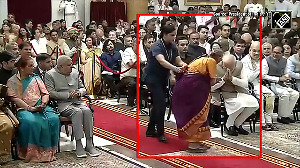
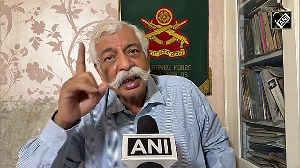
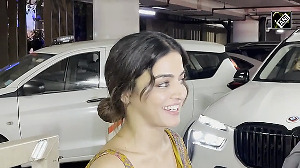
 © 2025
© 2025